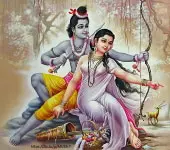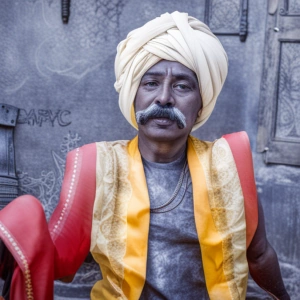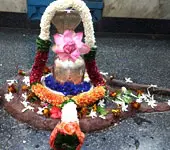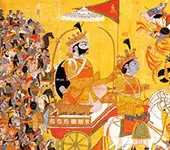Astika Reaches The Venue Of Sarpa Yajna
Astika is expected to stop the Sarpa yajna and save the serpents from extermination. Learn what happened when he reached its veue.
Transcript
(Click here to read more)
Sarpa-yajna of Janamejaya is going on. Billions of serpents have perished in the homagni. The primary target, Takshaka, has gone under the protection of Indra. Vasuki the king of Nagas is upset and has started fearing that the whole Naga-vamsha is going to be exterminated. Brahma had told that Astika, his sister's son will be able to stop the yajna. Vasuki told Jaratakaru, his sister, to send Astika to the venue of the Sarpa-yajna and stop it somehow. Jaratkaru told Astika, there is a reason behind why I got married to your father. Now, it is ti....
Transcript
(Click here)
Sarpa-yajna of Janamejaya is going on.
Billions of serpents have perished in the homagni.
The primary target, Takshaka, has gone under the protection of Indra.
Vasuki the king of Nagas is upset and has started fearing that the whole Naga-vamsha is going to be exterminated.
Brahma had told that Astika, his sister's son will be able to stop the yajna.
Vasuki told Jaratakaru, his sister, to send Astika to the venue of the Sarpa-yajna and stop it somehow.
Jaratkaru told Astika, there is a reason behind why I got married to your father.
Now, it is time for you to fulfill that purpose.
Astika wanted to know about it.
Jaratkaru told him everything.
About how Kadru the adi-matha of all serpents had cursed them to perish in fire.
About the bet between Kadru and Vinata about the color of the tail of the divine horse Ucchaishravas.
How Kadru wanted her sons, the serpents to hang on to the tail of Uchaishravas to make it appear black so that she can win the bet.
How most of them refused and how she cursed them.
How Brahma told Vasuki that if she gets his sister Jaratakaru married to a muni also with the same name Jaratkaru, a son will be born to them and he will be able to stop the Sarpa-yajna midway.
Astika told his uncle Vasuki, I will do my part, I will not disappoint you.
Stop worrying.
I am on my way to the venue of Janamejaya's yajna.
Janamejaya was already cautioned by a Vastu expert that the Sarpa-yajna will get stopped due to a brahmin.
He had instructed the guards that no stranger should enter the yajna vedi.
Then how did Astika manage to get inside?
When he was stopped by the guards, he started praising the yajna itself.
He said:
This yajna of Janamejaya is equal in its greatness to the yajnas of Soma, Varuna, and the one that Prajapati performed at Prayagraj.
Indra did a hundred yajnas.
Puru did a hundred yajnas.
This one yajna of Janamejaya stands equal to all of them.
This Sarpa-yajna is equal to the yajnas conducted by Yama, Harimedha, and Rantideva.
Yajnas of Gaya, Shashabindu, and Kubera:this Sarpa-yajna is equal to all of them.
This yajna is equal in greatness to the yajnas that king नृग king अजमीढ performed.
It is equal in glory to the yajnas that Sri Ramachandra performed.
Yudhishtira's yajna was famous even in Swargaloka.
Oh king Janamejaya, your yajna is also equally famous.
Sage Vyasa performed his yajnas meticulously.
Your yajna is also being done in perfection.
The purohitas of your yajna, they are so knowledgeable and brilliant and they are so sincere and dedicated.
Whatever you offer them in the form of dakshina will never go waste.
They are all disciples of Sage Vyasa.
Of course, Sage Vyasa only divided the Veda and compiled them as they can be easily used for performing yajna.
This system has originated from him.
So, everyone is a disciple of Vyasa.
Agni's different forms Vibhavasu, Chitrabhanu, Mahatma, Hiranyareta, Havishyabhoji, and Krishnavartma, they are all present in your homa kunda.
There is no other king in the world who cares so much for his subjects.
You are as powerful as Varuna and Yamaraja.
You are the protector of everyone.
You are as powerful as the great kings खट्वाङ्ग, नाभाग, दिलीप, ययाति, and मान्धाता.
You are as brilliant as Suryadeva himself
Like how Bheeshama-pitamaha observed the vow of celibacy perfectly, you have also observed the vrata required for performing this yajna.
You have the potential of Maharshi Valmiki.
You have kept anger under control like Vasishta.
You are as powerful as Indra.
You are as handsome as Srimannarayana.
You know dharma shastras like the Dharmaraja himself.
You are as virtuous as Lord Krishna.
You have got all the wealth the eight Vasus have got.
You have been doing so many yajnas.
In physical strength, you are equal to Dambhodbhava.
With weapons you are as dexterous as Parashurama.
You are as brilliant as the maharshisऔर्व and त्रित.
Meeting eyes with you is so difficult because of their brilliance.
You are like Bhageeratha.
Everyone was impressed.
Janamejaya, the purohitas, and even Agnideva.
Janamejaya said: even though he is so young he is so knowledgeable.
Now, if you all will permit me I want to fulfill his wish if he has any.
Recommended for you
Get Ramayana inside you- Then Ramayana will manage your life the right way
 Click here to know more..
Click here to know more..
The Life and Legacy of Akho (Akha Bhagat)

Discover the inspiring life and legacy of Akho (Akha Bhagat), a revered saint and poet from Gujarat, India. Learn about his teachings and impact on so....
Click here to know more..Ashtamurthy Raksha Stotram

he sharva bhooroopa parvatasutesha he dharma vri'shavaaha kaancheepureesha. davavaasa saugandhya bhujagendrabhoosha pri'thveesha maam paahi prathamaas....
Click here to know more..
English Topics
Mahabharatam
Click on any topic to open
- 96 Two Curses That Worked against Karna
- 95 What is behind Calling the Five Brothers the Pandavas
- 94 Give up an Individual IF....
- 93 Fascinating Birth Story of the Kauravas
- 92 Overcoming Grief - Lessons from King Senajit's story
- 91 Yayati's Wisdom
- 90 Yayati's Story
- 89 Brahmacharis Can Bless And Curse
- 88 Human Nature - Comples Mix Of Good And Bad
- 87 Results Of Good Karma
Please wait while the audio list loads..
30
Ganapathy
Shiva
Hanuman
Devi
Vishnu Sahasranama
Mahabharatam
Practical Wisdom
Yoga Vasishta
Vedas
Rituals
Rare Topics
Devi Mahatmyam
Glory of Venkatesha
Shani Mahatmya
Story of Sri Yantra
Rudram Explained
Atharva Sheersha
Sri Suktam
Kathopanishad
Ramayana
Mystique
Mantra Shastra
Bharat Matha
Bhagavatam
Astrology
Temples
Spiritual books
Purana Stories
Festivals
Sages and Saints
